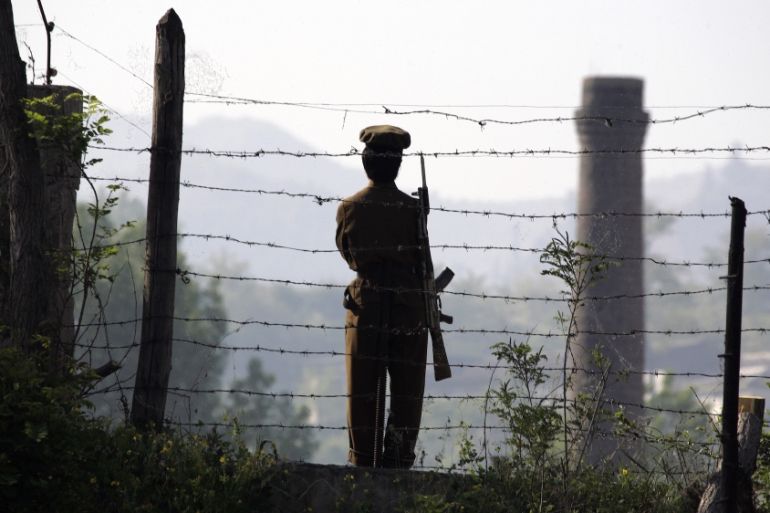Across the world, militaries have a sexual violence problem
From Pakistan to the US, it is still very difficult for military women to speak of sexual assault and seek justice.

In 2003, I was a young Flying Officer in the Pakistan Air Force, training under a supervisor who was notorious for making advances on women. He lived up to his reputation. During my one year at the airbase, he inappropriately touched and made indecent comments and sexually explicit jokes to me and my female colleagues. Although I was not physically assaulted, the psychological trauma from these experiences was unbearable.
It is never easy to speak of sexual abuse, and I never reported him. Instead, I tried to erase this traumatic episode of my life from my memory – until recently. Last year, the revelations of pervasive sexual harassment and assault in the US film industry, and the consequent rise of the #MeToo movement, brought back these painful memories. Like other women across different industries and countries, I found the courage to speak out.
Keep reading
list of 4 itemsManhattan prosecutors announce retrial for film producer Harvey Weinstein
‘Profoundly unjust’: Reactions to court overturning Weinstein’s conviction
Top New York court overturns Harvey Weinstein’s 2020 rape conviction
Because armies are male-dominated – across the world men account for more than 90 percent of military staff – and are intrinsically associated with certain notions of masculinity and aggression, they are difficult workplaces for women to navigate.
Furthermore, for centuries, armies have used rape as a weapon of war and some continue to do so. In recent years, there has also been growing evidence of the pervasiveness of sexual violence perpetrated by peacekeeping forces and of sexual assault committed within the military ranks across the world.
Despite increasing media attention on sexual crimes perpetrated by troops, information and statistics on sexual crimes within the military are still difficult to come by. Few countries around the world publish official data on the subject, and what is publicly available often underrepresents the true extent of the problem.
Israel, which mandates military service for both men and women, had 893 cases of sexual assault reported in the last year. The Pentagon estimates that 15,000 members of the US military have been sexually assaulted. In the British military, four in 10 military women are victims of sexual violence. A 2016 survey estimated that 27 percent of women in the Canadian armed forces face sexual abuse during their career.
Official reports on sexual violence in the military are even harder to find in developing countries. In my country, Pakistan, there have not been any reports released by the military on sexual crimes committed within its ranks. In countries like India, Peru, North Korea, Eritrea and Syria, there have been only occasional media reports on sexual assault committed by troops or anecdotal evidence published in human rights reports.
Across the world, sexual violence is very difficult for women in the military to address. Victims are often blamed for “provoking” the sexual abuse with their behaviour or dress. Reporting sexual harassment and assault can mean that the victim is labelled as a person of “loose morals” or as “a liar”.
In more conservative settings, virginity and notions of honour make reporting sexual violence even more difficult, as women fear bringing shame to their families and losing their chances of marriage. At times, military women also trivialise sexual harassment to fit into the masculine setting. They may also discourage other women from reporting their experiences.
One of the biggest challenges in addressing sexual violence in the army is that military laws and procedures are different from civilian ones. Speaking to the media is prohibited and military institutions can hide behind legal loopholes or national security legislation to dodge accountability for crimes.
Sexual violence cases are heard in male-dominated military courts that operate under military law, which makes it difficult for militaries to try abusive people in top leadership positions. Often perpetrators sit in the same chain of command that is supposed to act on the complaint, leaving survivors of sexual violence fearing retaliation if they report. There is a gap in evidence-based studies on the issue, but data from the US military suggest that more than 48 percent of survivors refuse to proceed with trial after reporting sexual violence.
Solutions to the problem of sexual violence vary. Countries like Pakistan follow a strict policy of gender segregation to minimise interaction between men and women in the military. This is effective to an extent, given the conservative culture in the country.
Norway has taken the exact opposite route of putting men and women together in dorms and this strategy also seems to be working in reducing sexual assault rate. Countries like the US, France, UK, Israel and Canada have made some efforts to reform reporting and response mechanisms for sexual violence crimes to ensure protection for the victims and a higher likelihood for the perpetrators to be held accountable. None of these efforts has been enough, however.
To truly address sexual violence within the military, comprehensive changes must be implemented. These include: adapting practices to combat sexual harassment while keeping victims safe; developing action plans to prevent sexual harassment; training troops to report sexual harassment both as victims and as witnesses; creating safe and private channels of reporting sex crimes without fear of retaliation; amending military laws in countries that don’t already classify sexual harassment as a specific crime to make it one; publicising the sexual harassment data and actions taken on them; and making provisions for victims to take sexual harassment cases to civil courts.
These steps are essential if we want to create a safe environment for the women and men who serve.
The views expressed in this article are the author’s own and do not necessarily reflect Al Jazeera’s editorial stance.
